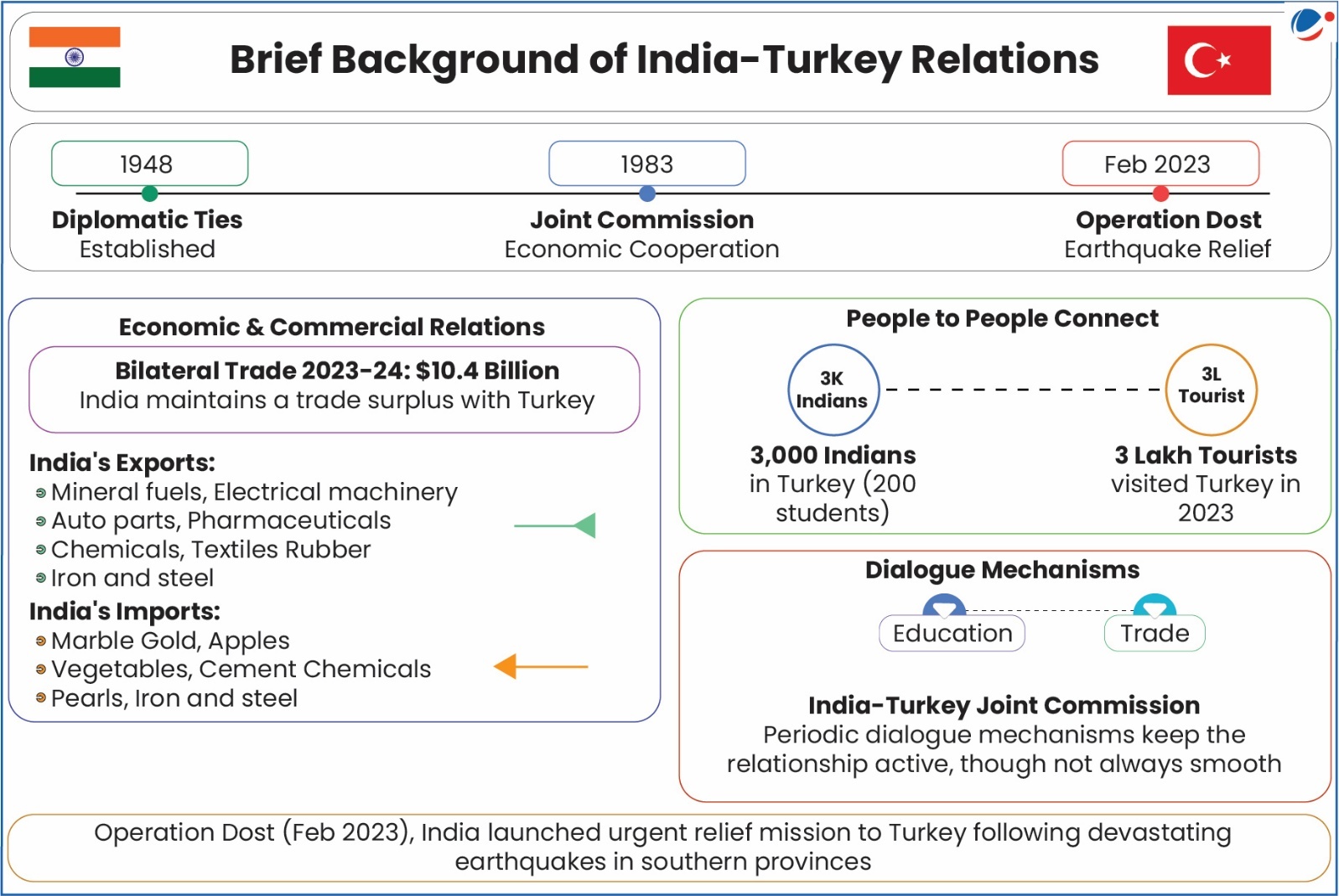Why in the News?
India–Turkey relations have worsened after Turkey criticized India's counter-terror strikes in Pakistan following the Pahalgam attack.
More on the news
- Turkey condemned India's Operation Sindoor, labeling as "provocative" and warning that strikes inside Pakistan increased the risk of a wider conflict.
- During Operation Sindoor, Turkish-made Songar drones used by Pakistan were neutralized by Indian air defense.
- Following this, India also revoked the security clearance of Turkish company Celebi Aviation operating at 9 Indian airports.
- Several Indian universities, including Jamia Millia Islamia have suspended academic collaborations with Turkish institutions.

Why Turkey Matters for India?
- Strategic Location: Turkey connects Europe and Asia. It is also part of the International North-South Transport Corridor (INSTC), essential for boosting India's trade with Europe and Central Asia.
- Regional Influence: Since Turkey is an influential player in its immediate neighborhood, i.e. Middle East, Black Sea region etc. Ties with Turkey can help India stay informed and influence developments in these areas.
- Global Forums: Both are members of the G20 and have common interests in global governance reforms, including UN Security Council (UNSC) reform. Turkey has expressed its support for India's bid for a permanent seat on the UNSC.
Contemporary Challenges in India–Turkey Relations
- Turkey's Military & Diplomatic Support to Pakistan: Turkey is Pakistan's 2nd largest arms supplier (after China), supplying drones, corvettes, missiles, and F-16 upgrades.
- This strengthens Pakistan's defense resilience and its ability to manage prolonged escalatory situations with India.
- Meddling in Kashmir Issue: Turkey supports Pakistan's stand on Kashmir and opposes India's 2019 Article 370 abrogation at international forums like the UN.
- Narrative Destabilization: Turkey-backed social media campaigns and digital content try to internationalize India's internal issues, creating narrative threats.
- Emerging Turkey–Azerbaijan–Pakistan Axis: Turkey and Azerbaijan condemned India's Operation Sindoor.
- Turkey and Pakistan are members together of the Baghdad Pact and the Central Treaty Organization (CENTO). The two countries were part of the Regional Cooperation for Development (RCD) format too, along with Iran.
- Islamist Rhetoric & Pan-Islamism: President Erdogan's Islamist positioning and global Muslim solidarity often lead to criticism of India's domestic policies, straining ties further.
Turkey's Evolving Pakistan-Centric Tilt
|
Conclusion
India–Turkey relations have witnessed fluctuations shaped by historical alignments, ideological postures, and emerging geopolitical realities. While challenges persist, leveraging multilateral forums, countering narrative threats, and strengthening ties with Turkey's regional rivals (Greece, Cyprus, Armenia, Israel, and the UAE) can help maintain a strategic balance. At the same time, recalibrating relations based on mutual respect and shared interests can pave the way for a more stable, pragmatic, and forward-looking partnership.






